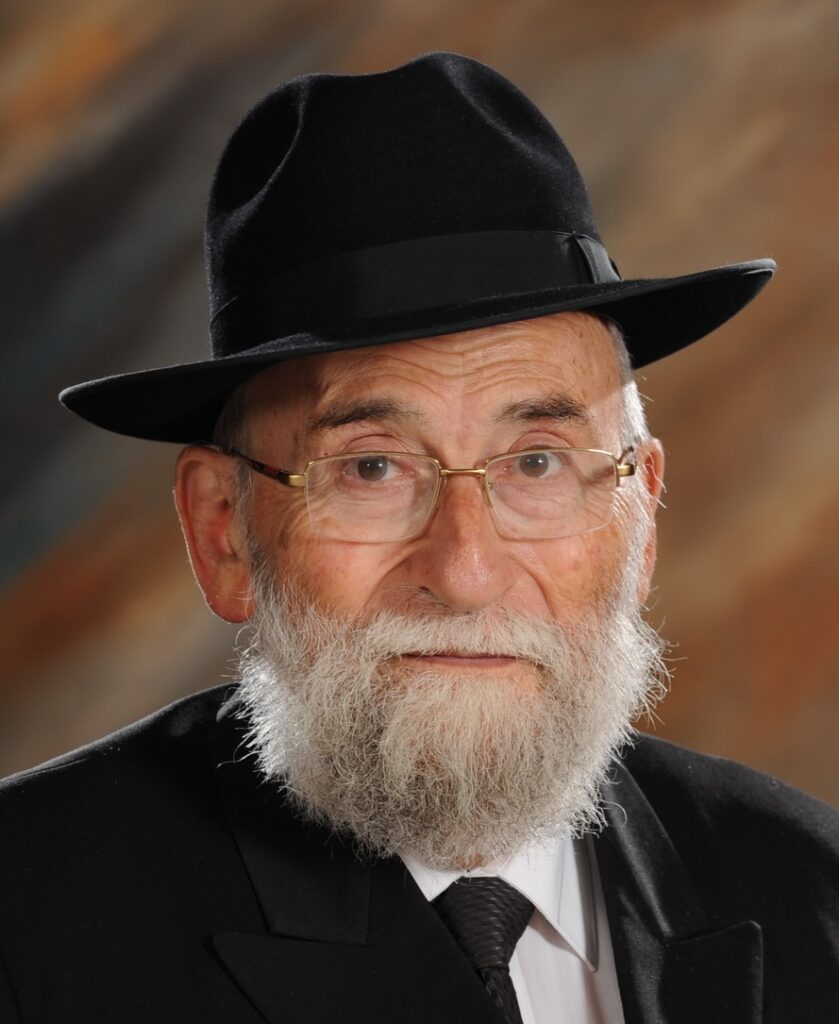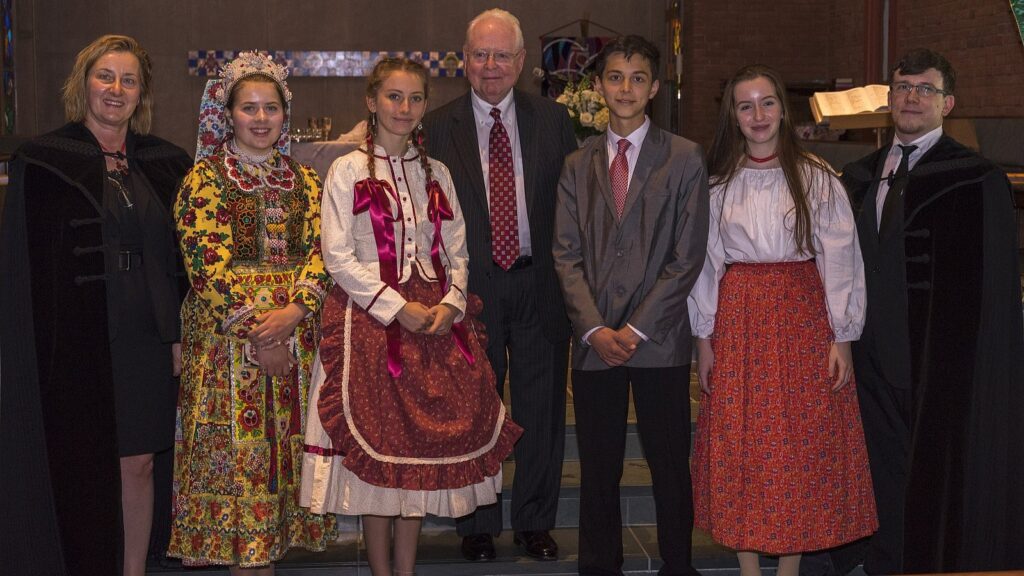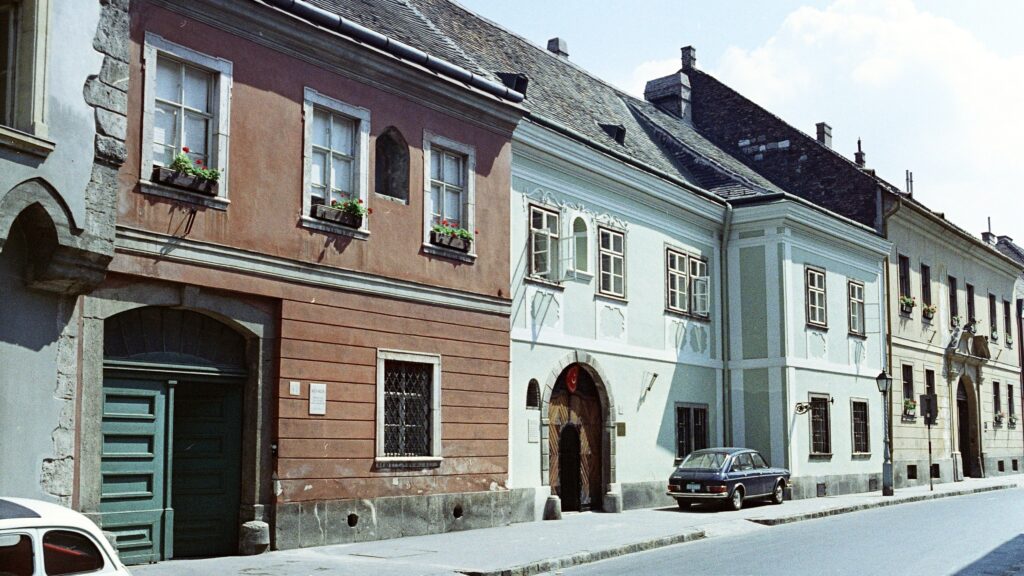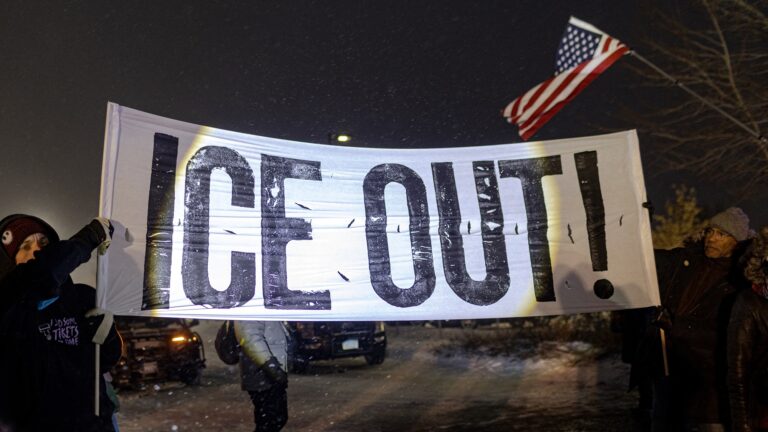While the name Kraus Naftali (1932–2018) is likely familiar to Hungarian Jewish readers, perhaps he is not well known among the larger audience. As a writer, journalist—and not least, an enthusiastic Lubavitcher Hasid—Kraus authored numerous books and articles on Judaism, guiding countless Hungarian Jews back to Yiddishkeit in the years following the regime change of 1989. Kraus was born in Budapest to an Orthodox family and survived the Holocaust as a child in the ghetto. In 1949 he made aliyah, served in the military, and later wrote for the Israeli press in Hebrew, Hungarian, and even Yiddish.[1]
As a hardline religious Zionist and an author who published in Hungarian (among other languages), Kraus understandably drew the attention of Kádár-era state security. He especially provoked the ire of the communist regime by regularly attacking the collaborationist leadership of the National Representation of Hungarian Israelites (Magyar Izraeliták Országos Képviselete, MIOK) in the now largely forgotten right-wing Israeli–Hungarian newspaper A hét tükre (The Mirror of the Week), edited by Ervin Abádi. Copies of these fiery articles routinely landed on the desks of counterintelligence officers and bureaucrats of the State Bureau for Church Affairs (Állami Egyházügyi Hivatal, ÁEH) as part of the usual press reviews. Although state security monitored Kraus’s activities for nearly 20 years, this story has not been explored until now.

Although the documents have survived only in fragmentary form, they still make it clear that the authorities registered Kraus as a dangerous, reactionary Zionist. The earliest record mentioning his name is a report dated 5 April 1967, written by the state security intelligence station (or rezidentúra in Hungarian, ie, undercover intelligence officers posing as diplomats) operating at the Hungarian embassy in Tel Aviv. The secret police officer stationed at the embassy listed the journalists with whom he had established contact (naturally without them knowing his true identity):
‘Kraus Naftali, journalist for the newspaper Maariv, works on editing the holiday supplement. He is responsible for Hungarian-related topics at the paper. Approximately 35 years old, tall, stout, of religious conviction—hence he has grown a long beard. Politically, he is right-wing. I meet with him fairly often, usually in connection with his articles. I have not yet been able to obtain any valuable information from him, as he is very cautious in his statements. I became acquainted with him last autumn, when he called me on the phone and asked for literature about the 1956 counterrevolution. He is married.’[2]
It is not surprising in itself that an intelligence officer would speak with a right-wing Zionist, since his task was to identify as many potential contacts as possible in Israel. However, they were clearly unable to establish a deeper relationship with Kraus, as Hungary broke off diplomatic relations with Israel following the Six-Day War in 1967, and the members of the intelligence station returned home.
The next document concerning Kraus was written eight years later, but it makes clear that the journalist had not been forgotten in the meantime. In June 1975, a covert investigation was launched against the popular Jewish writer György Moldova due to his presumed Zionist connections. Although Moldova was not a Zionist, he fell under suspicion simply because he received a letter from Kraus in Israel, congratulating him on the first volume of his Holocaust trilogy and inquiring about the upcoming instalments:
‘Kraus Naftali, editor at the Israeli newspaper Maariv, informed György Moldova in a letter dated 2 May 1975, that the paper had published his latest literary work and offered his congratulations. He also asked in what setting the other two volumes would take place.’[3]
‘Although Moldova was not a Zionist, he fell under suspicion simply because he received a letter from Kraus in Israel’
Shockingly, this alone was enough to trigger a covert investigation against Moldova, even though the document itself acknowledged that Kraus did not appear in the Central Counterintelligence Registry, and his only ‘offense’ was that, at an Israeli newspaper, he ‘follows so-called “Hungarian affairs” and occasionally comments on them.’
According to his autobiography, he returned to Budapest for the first time in May 1984, after years of having his visa applications rejected. ‘Those who made the decisions on this matter in Budapest knew who I was—and the rejections were unequivocal,’ he wrote. He claimed he discovered that both his phone and hotel room had been bugged. Perhaps this was true, perhaps not—the counterintelligence services were certainly monitoring him, but by that time, domestic surveillance technology was quite sophisticated, and not as primitive as Kraus assumed. He also claimed to have conducted an interview during that visit with László Bai, a department head at the ÁEH, which reportedly went so badly that when he reapplied for a visa at the end of 1985, it was denied. According to Kraus, it was ultimately Alajos Chrudinák—a journalist otherwise known for his strongly anti-Israel stance—who pulled strings at the Ministry of Interior to secure him a visa. Kraus also believed that the original visa denial resulted from a ‘denunciation’ by the infamous widow Mrs Géza Seifert, the chief secretary of MIOK.[4]
Perhaps it happened this way, perhaps not, but what is certain is that a so-called Daily Operative Information Report (Napi Operatív Információs Jelentés, NOIJ) from January 1986 survives concerning Kraus. These NOIJs were produced between 1979 and 1990 by the country’s various state security branches to inform the Ministry of Interior’s leadership. According to the report, Kraus Naftali, who was listed on the ‘entry ban list’, entered Hungary under a modified name—‘Karausz Naftali’—and held talks at the state-owned publishing company (Lapkiadó Vállalat) with Norbert Siklósi, regarding the Hungarian distribution of Hét Tükre, his right-wing Hungarian-language newspaper published in Israel.
Kraus and his Zionist associates were quoted as saying that ‘it doesn’t matter what high politics dictates, what matters is the friendship between the two countries’—a noble sentiment that was presented in the report as something of an indictment. As a measure, it was noted that the Ministry of Interior’s Department III/II-4 (counterintelligence) would monitor the negotiations concerning the newspaper’s distribution.[5]
The next NOIJ—from the summer of 1986—shares even more interesting details about Kraus. According to it, the counterintelligence conducted a confidential investigation under the codename ‘Menóra’ targeting several young Zionists: most of them did not become public figures later, except for mathematician András Rácz, who openly acknowledged his involvement in the case in a 1995 interview with Zsófia Mihancsik. The NOIJ recorded that the young people had Israeli ‘contacts’, including mathematician Eliezer Even (later the Jewish Agency’s representative in Hungary) and Kraus Naftali. The youngsters carried out their Zionist activities under a religious guise but were already considering giving it all up.[6]
The latter remark may suggest that the state security had already taken certain measures against them, and indeed, according to another NOIJ from April 1987, the group was dissolved through operative means in the autumn of 1986. Presumably, this included granting permission for one of the group’s members to make aliyah. According to the report, Kraus, described as ‘one of the Israeli leaders of the group’, called one of the targeted Zionists by phone from Israel and ‘congratulated them on being allowed to emigrate to Israel’. He stated that they would be the ‘first swallows’, calling their departure ‘a celebration of liberation’. The source of this information was telephone surveillance. Regarding operative measures, it was noted that counterintelligence would continue the confidential investigation.[7]
‘He stated that they would be the “first swallows”, calling their departure “a celebration of liberation”’
One month later, another NOIJ reported on Kraus’s activities. According to it, through ‘K-monitoring’ (mail traffic monitoring), counterintelligence learned that in letters Kraus wrote to several contacts in Hungary—such as the writer and poet András Mezei and the writer and journalist László Rapcsányi—he ‘advocates for halting the assimilation of Hungarian Jewry’. He asked writer János Kőbányai to write for A Hét Tükre about ‘how and in what way he sees the possibility of saving the remaining Hungarian Jewry. He wanted him to address what it means to be Jewish in Hungary if one is not religious, and what it is that makes one’s children Jewish. According to Kraus’s opinion, only the establishment of a Jewish elementary school can save the small Jewish youth from being lost and from the mortal danger of assimilation.’ The report states that the confidential investigation in the ‘Menóra’ case continues. Since the letters that Kraus wrote to several people were intercepted, it is logical to conclude that the letters from the Israeli journalist were specifically monitored.[8]
Finally, there was one last NOIJ report on Kraus from January 1989, again issued by counterintelligence. According to this, Kraus—who was then staying in Hungary—informed a contact named Miklós at the Hungarian Chamber of Commerce that the Hungarian consul in New York had given him advice on how to be removed from the travel blacklist. The report states that the Ministry of Interior’s (BM’s) III/II-4 division had kept Kraus on the blacklist since 1983 due to his articles attacking the Hungarian People’s Republic. ‘His current single-entry visa was granted for operational reasons’—the report stated, which could mean many things, including that they wanted to monitor Kraus’s movements and contacts or wiretap him. The BM’s II/II-4 division promised to follow events closely and inform the BM’s III/I Group Directorate, in other words, the intelligence service. However, they likely didn’t have much time left for this, as the communist dictatorship collapsed less than a year later.[9]
Although we could not process Kraus’s journalistic work here, the press review materials clearly show that the Israeli journalist often criticized socialist Hungary and its compliant Jewish religious leaders in blunt terms—criticism that was obviously justified and well-deserved. In return, the critical articles were carefully archived, the parts disliked by the regime were meticulously underlined, and evidently it was based on this (among other things) that the decision was made to put Kraus on the blacklist.
Overall, it is clear that Kraus was a religious Israeli Hungarian publicist who rightly earned the communist dictatorship’s ire. To hinder his activities, a covert procedure was launched, and his conversations and correspondence were monitored both directly and indirectly; in other words, he was treated as an enemy of the regime for decades. Although his interesting—and somewhat divisive—career was already valuable in itself, these details undoubtedly enrich our knowledge of Kraus and the socialist state security.
[1] Kraus Naftali, Az áldozat visszatér, Bp, Polgart, 2002.
[2] Állambiztonsági Szolgálatok Történeti Levéltára (ÁBSZTL), 3.2.5. O-8-089/3, 171.
[3] ÁBSZTL, 3.1.5. O-18657, 7.
[4] Kraus, Az áldozat visszatér, pp. 33–38, 64–66, 69–71.
[5] ÁBSZTL, 2.7.1. III/II-20/1986.01, 30.
[6] ÁBSZTL, 2.7.1. III/II-137/1986.07, 22.
[7] ÁBSZTL, 2.7.1. III/II-80/1987.04, 24.
[8] ÁBSZTL, 2.7.1. III/II-93/1987.05, 14.
[9] ÁBSZTL, 2.7.1. III/II-7/1989.01, 10.
Related articles:







